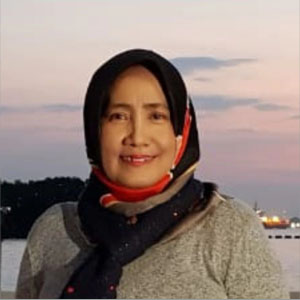Keynote Speaker

Prof. Tri Retnaningsih Soeprobowati
School of Postgraduate Studies, DiponegoroUniversity, Semarang, IndonesiaCluster for Paleolimnology, School of Postgraduate Studies, DiponegoroUniversity, Semarang, Indonesia
Department of Biology, Faculty of Science and Mathematics, DiponegoroUniversity, Semarang, Indonesia
Speech Title: The Sediment Carbon Stock in Aquatic Ecosystems: Mitigating Climate Change
Abstract: The Wetland ecosystem significantly contributes to mitigating climate change by storing carbon amounts. However, the peatland burned, conversion of wetlands to agriculture, and settlement has reduced the carbon emission by up to 50% of the total Indonesian emission. Therefore, research on carbon stock estimation in tropical aquatic ecosystems is crucial to provide a database as a reference for wetlands management. Freshwater wetland (Lake Maninjau, Sumatra) and estuarine wetland (mangrove Pasarbanggi Rembang, Central Java) hadbeen compared to their capability of restoring carbon. In Maninjau lakeside, the sediment organic carbon (SOC) stock ranges from 284.23–442.59 Mg C ha-1. The SOC stocks tend to be lower in locations with intensive agricultural settlements than in forest areas. Comparing to the mangrove ecosystem, particularly in Pasarbanggi Rembang has SOC stock range 114.14 to 497.38 Mg C ha-1, contributed 36.1-78.19 % of the total carbon stock. SOC stocks show an increasing trend with the increasing sediment depth. Vegetation cover plays an important role in the SOC stock. The restoration and conservation of wetlandsare crucial for maintaining the sustainability of the aquatic ecosystem. Preserving and protecting wetlands may support global climate change mitigation through sequestration processes that can reduce carbon emissions in the atmosphere.
Biography: Prof. Tri Retnaningsih Soeprobowati is Vice Dean for Resources and Innovation, School of Postgraduate Studies, Universitas Diponegoro, Indonesia 2015-2024. She is a lecturer at the Department of Biology for 31 years, and at the program of doctorate and Master of Environmental Science for 10 years. Her special fields are Environmental Biology, bioindicator of water quality. She is an expert for the Ministry of Environment and Forestry (since 2011); have research collaboration with BATAN (since 2010), with Tokyo Gakugei University, Japan (2011): SimRiver: Simulation software for the understanding of the river environment; with University of Bangor – Aberystwyth, UK – Western Carolina, USA – ITB - Biotrop – UNDIP – Brawijaya – PT Bukit Asam (2014-2017); Federation University, Australia (2009-now), Australia Nuclear for Science and Technology Organization (ANSTO, 2009 – now). Since 2020 she interests in paleolimnology, that combines biostratigraphy using diatom, and chronostratigraphy by dating sediment using a nuclear application (210Pb or 14C) for environmental management. Reconstruction of past environmental changes for lake management. Find the future from the past.
